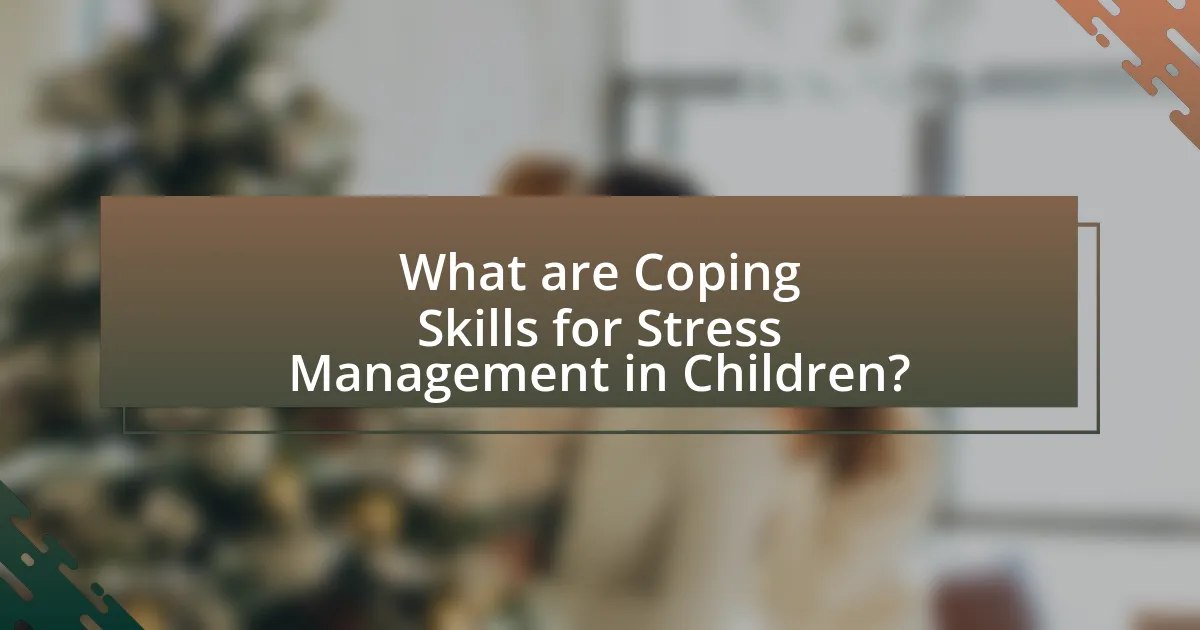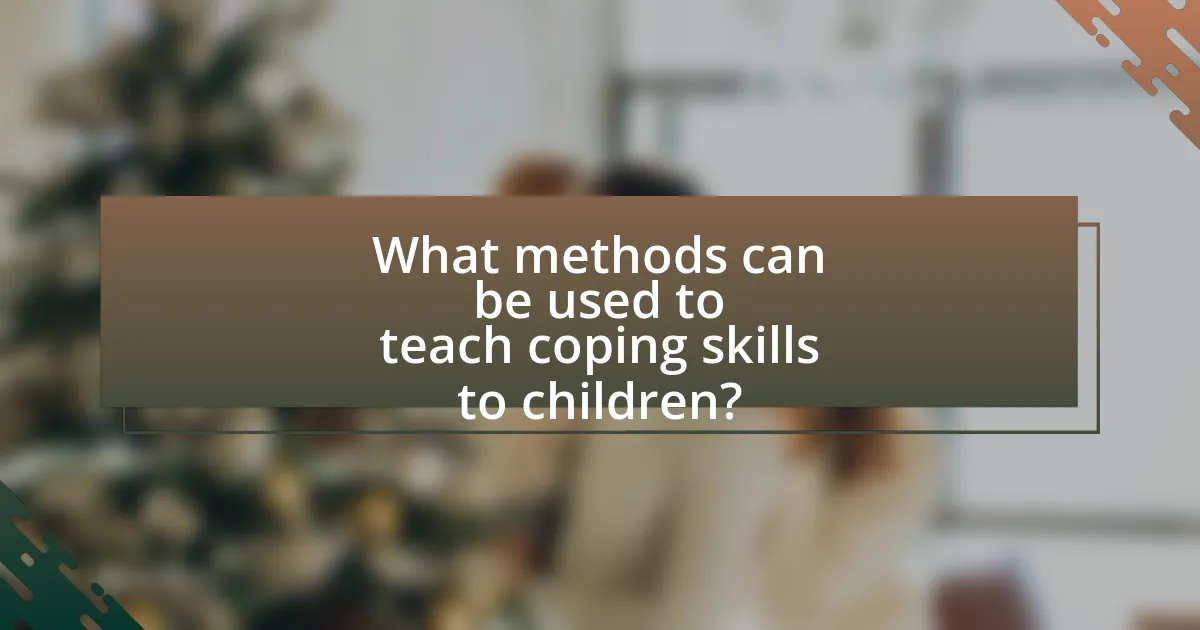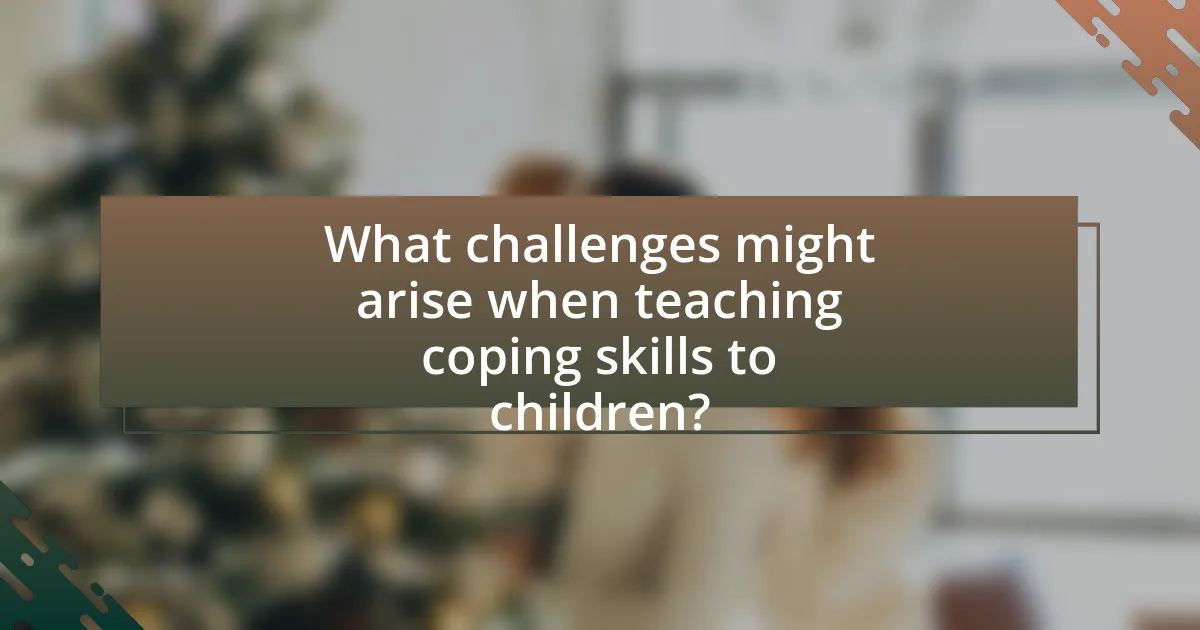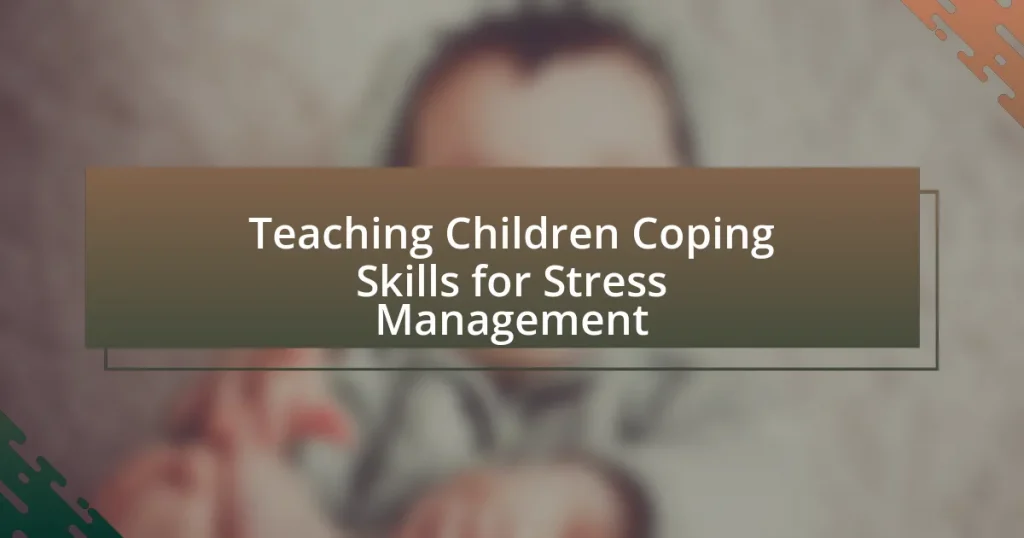Teaching children coping skills for stress management is essential for their emotional development and mental well-being. The article outlines various coping techniques, including deep breathing, mindfulness, physical activity, and problem-solving strategies, which help children manage their emotions and reduce stress. It emphasizes the importance of age-appropriate coping skills, the long-term benefits of teaching these strategies, and effective methods for parents and educators to implement them. Additionally, the article discusses challenges in teaching coping skills, ways to engage reluctant learners, and available resources to support this learning process.

What are Coping Skills for Stress Management in Children?
Coping skills for stress management in children include techniques such as deep breathing, mindfulness, physical activity, and problem-solving strategies. These skills help children manage their emotions and reduce stress effectively. For instance, deep breathing exercises can lower anxiety levels by promoting relaxation, while physical activities like running or playing sports release endorphins that improve mood. Mindfulness practices, such as focusing on the present moment, enhance emotional regulation and resilience. Research indicates that teaching these skills can lead to improved mental health outcomes in children, as evidenced by studies showing reduced anxiety and better coping mechanisms in those who practice them regularly.
How do coping skills help children manage stress?
Coping skills help children manage stress by providing them with strategies to handle difficult emotions and situations effectively. These skills enable children to identify stressors, express their feelings, and implement problem-solving techniques, which can reduce anxiety and improve emotional regulation. Research indicates that children who learn coping skills are better equipped to face challenges, leading to lower levels of stress and improved mental health outcomes. For instance, a study published in the Journal of Child Psychology and Psychiatry found that children who practiced coping strategies showed significant reductions in stress-related symptoms compared to those who did not.
What types of coping skills are most effective for children?
Effective coping skills for children include problem-solving, emotional regulation, and social support. Problem-solving skills enable children to identify solutions to challenges, fostering resilience. Emotional regulation techniques, such as deep breathing and mindfulness, help children manage their feelings and reduce anxiety. Social support, including seeking help from peers or adults, provides a network for emotional expression and guidance. Research indicates that children who practice these skills demonstrate improved emotional well-being and better stress management, as evidenced by studies showing enhanced coping abilities in children trained in these areas.
How do coping skills vary by age and developmental stage?
Coping skills vary significantly by age and developmental stage, reflecting the cognitive, emotional, and social capabilities of individuals. Young children typically rely on simple coping strategies such as distraction or seeking comfort from caregivers, as their understanding of complex emotions is limited. As children grow into adolescence, they begin to develop more sophisticated coping mechanisms, including problem-solving and emotional regulation techniques, influenced by their increased cognitive abilities and social experiences. Research indicates that adolescents often utilize both adaptive strategies, like seeking social support, and maladaptive strategies, such as avoidance, highlighting the complexity of coping during this stage (Compas et al., 2017, Journal of Adolescence). Thus, the evolution of coping skills is closely tied to developmental milestones, with each stage presenting unique challenges and opportunities for growth.
Why is teaching coping skills important for children?
Teaching coping skills is important for children because it equips them with the tools to manage stress and emotional challenges effectively. Children who learn coping skills are better able to navigate difficult situations, reducing the risk of anxiety and depression. Research indicates that children with strong coping mechanisms demonstrate improved emotional regulation, leading to better academic performance and healthier relationships. For instance, a study published in the Journal of Child Psychology and Psychiatry found that children who practiced coping strategies showed a significant decrease in behavioral problems and emotional distress. Thus, teaching coping skills fosters resilience and promotes overall mental well-being in children.
What are the long-term benefits of teaching coping skills?
Teaching coping skills provides long-term benefits such as improved emotional regulation, enhanced resilience, and better mental health outcomes. Individuals equipped with coping skills are more likely to manage stress effectively, reducing the risk of anxiety and depression over time. Research indicates that children who learn coping strategies demonstrate greater academic performance and social competence, as they can navigate challenges more successfully. A study published in the Journal of School Psychology found that students who received coping skills training showed significant reductions in behavioral problems and improved emotional well-being, highlighting the lasting impact of these skills on their overall development.
How do coping skills impact a child’s emotional development?
Coping skills significantly enhance a child’s emotional development by equipping them with strategies to manage stress and regulate their emotions effectively. When children learn to utilize coping skills, they can better navigate challenging situations, which fosters resilience and emotional intelligence. Research indicates that children who practice effective coping strategies demonstrate improved emotional regulation, leading to lower levels of anxiety and depression. For instance, a study published in the Journal of Child Psychology and Psychiatry found that children who engaged in problem-solving and emotional expression techniques showed greater emotional stability and social competence. This evidence underscores the critical role that coping skills play in shaping a child’s emotional growth and overall well-being.

What methods can be used to teach coping skills to children?
Coping skills can be taught to children through various methods, including role-playing, mindfulness exercises, and cognitive-behavioral techniques. Role-playing allows children to practice responses to stressful situations in a safe environment, enhancing their ability to manage real-life challenges. Mindfulness exercises, such as deep breathing and guided imagery, help children develop awareness of their emotions and promote relaxation. Cognitive-behavioral techniques, which involve identifying negative thought patterns and replacing them with positive ones, empower children to reframe their perspectives on stressors. Research indicates that these methods can significantly improve children’s emotional regulation and resilience, as evidenced by studies showing enhanced coping abilities in children who participate in structured coping skills programs.
How can parents and educators effectively teach coping skills?
Parents and educators can effectively teach coping skills by modeling healthy behaviors, providing structured environments, and engaging children in role-playing scenarios. Modeling involves demonstrating effective coping strategies, such as deep breathing or positive self-talk, which children can observe and imitate. Structured environments, such as classrooms with clear routines, help children feel secure and understand expectations, making it easier for them to learn and practice coping skills. Role-playing scenarios allow children to practice these skills in a safe setting, reinforcing their ability to manage stress in real-life situations. Research indicates that children who learn coping skills early are better equipped to handle stress and adversity later in life, as evidenced by studies showing improved emotional regulation and resilience in those exposed to such teaching methods.
What role do role-playing and modeling play in teaching coping skills?
Role-playing and modeling are essential techniques in teaching coping skills, as they provide children with practical, experiential learning opportunities. Role-playing allows children to practice responses to stressful situations in a safe environment, enhancing their ability to manage real-life challenges. Modeling, on the other hand, involves demonstrating effective coping strategies, which children can observe and imitate. Research indicates that children learn behaviors more effectively when they see them modeled by adults or peers, reinforcing the acquisition of coping skills. For instance, a study published in the Journal of Child Psychology and Psychiatry found that children who engaged in role-playing scenarios exhibited improved emotional regulation and problem-solving abilities. Thus, both role-playing and modeling significantly contribute to the development of effective coping mechanisms in children.
How can storytelling be used to illustrate coping strategies?
Storytelling can be used to illustrate coping strategies by providing relatable narratives that demonstrate how characters effectively manage stress and adversity. These narratives allow children to see practical examples of coping mechanisms, such as problem-solving, emotional regulation, and seeking support from others. Research indicates that stories can enhance emotional understanding and empathy, making it easier for children to internalize these strategies. For instance, a study published in the Journal of Child Psychology and Psychiatry found that children who engaged with stories depicting coping strategies showed improved emotional resilience and problem-solving skills.
What activities can reinforce coping skills in children?
Activities that can reinforce coping skills in children include mindfulness exercises, art therapy, physical activities, and role-playing scenarios. Mindfulness exercises, such as deep breathing and meditation, help children focus on the present moment, reducing anxiety and enhancing emotional regulation. Art therapy allows children to express their feelings creatively, which can facilitate emotional processing and coping. Physical activities, like sports or dance, promote the release of endorphins, improving mood and resilience. Role-playing scenarios enable children to practice problem-solving and social skills in a safe environment, enhancing their ability to cope with real-life challenges. Research indicates that these activities can significantly improve children’s emotional well-being and coping strategies, as evidenced by studies showing increased resilience and reduced stress levels in children who engage in such practices.
How can mindfulness exercises be integrated into daily routines?
Mindfulness exercises can be integrated into daily routines by incorporating short practices during common activities. For instance, parents can guide children to practice deep breathing while waiting in line or during car rides, which helps them focus on their breath and promotes relaxation. Research indicates that even brief mindfulness practices can reduce stress and improve emotional regulation in children, as shown in a study published in the Journal of Child and Family Studies, where participants reported lower anxiety levels after engaging in mindfulness activities. Additionally, setting aside specific times for mindfulness, such as a few minutes before bedtime for guided meditation, can create a consistent routine that reinforces these skills.
What games or activities promote stress management skills?
Games and activities that promote stress management skills include mindfulness-based games, yoga, and cooperative team sports. Mindfulness games, such as “Mindful Breathing” or “Body Scan,” help children focus on their breath and bodily sensations, reducing anxiety and enhancing emotional regulation. Yoga encourages physical movement and relaxation, which has been shown to lower stress levels in children, as evidenced by a study published in the Journal of Pediatric Psychology, where participants reported decreased anxiety after regular yoga practice. Cooperative team sports, like soccer or basketball, foster social connections and teamwork, which can provide emotional support and reduce feelings of isolation, contributing to better stress management.

What challenges might arise when teaching coping skills to children?
Teaching coping skills to children can present several challenges, including developmental readiness, varying individual needs, and resistance to learning. Developmental readiness affects a child’s ability to understand and apply coping strategies; younger children may struggle to grasp abstract concepts. Additionally, each child has unique emotional and cognitive needs, making it difficult to implement a one-size-fits-all approach. Resistance can stem from a lack of interest or perceived relevance of the skills being taught, which can hinder engagement and effectiveness. Research indicates that children often require tailored approaches to effectively learn and utilize coping skills, highlighting the importance of adaptability in teaching methods.
How can resistance to learning coping skills be addressed?
Resistance to learning coping skills can be addressed by employing a supportive and engaging teaching approach that fosters a safe learning environment. Research indicates that children are more receptive to learning when they feel understood and supported; for instance, a study published in the Journal of Child Psychology and Psychiatry found that positive reinforcement and emotional support significantly enhance children’s willingness to engage in skill-building activities. Additionally, incorporating interactive and relatable methods, such as role-playing or storytelling, can make the learning process more appealing and relatable, thereby reducing resistance.
What strategies can be used to engage reluctant learners?
To engage reluctant learners, educators can implement strategies such as incorporating interactive activities, providing choices in learning tasks, and connecting lessons to students’ interests. Interactive activities, like group discussions or hands-on projects, foster participation and make learning more appealing. Allowing students to choose their tasks enhances their sense of autonomy, which can increase motivation. Additionally, linking lessons to personal interests or real-life applications helps students see the relevance of what they are learning, thereby increasing engagement. Research indicates that these strategies can significantly improve student participation and motivation, as evidenced by studies showing that student choice and relevance in learning lead to higher engagement levels.
How can parents and educators overcome common misconceptions about coping skills?
Parents and educators can overcome common misconceptions about coping skills by providing accurate information and practical demonstrations of effective strategies. Misconceptions often stem from a lack of understanding about what coping skills entail; for instance, many believe that coping is solely about avoiding stress rather than managing it. By educating themselves and others about the various types of coping strategies—such as problem-solving, emotional regulation, and seeking social support—parents and educators can clarify these misunderstandings.
Research indicates that teaching children specific coping techniques, such as mindfulness and cognitive restructuring, can significantly enhance their ability to manage stress (Keng, Smoski, & Robins, 2011, Journal of Clinical Psychology). Furthermore, modeling these skills in real-life situations allows children to see their practical application, reinforcing the idea that coping is a learned behavior rather than an innate trait. By fostering an environment that encourages open discussions about emotions and coping methods, parents and educators can effectively dispel myths and promote healthier coping mechanisms among children.
What resources are available for teaching coping skills?
Resources available for teaching coping skills include books, online courses, workshops, and therapeutic programs. Books such as “The Coping Skills Workbook for Kids” by Janine Halloran provide structured activities for children to learn coping strategies. Online platforms like Coursera and Udemy offer courses specifically designed for educators and parents to teach coping skills effectively. Workshops conducted by mental health professionals often focus on practical techniques for stress management. Additionally, therapeutic programs, such as Cognitive Behavioral Therapy (CBT) for children, provide evidence-based methods for developing coping skills. These resources are validated by research indicating their effectiveness in enhancing children’s emotional resilience and stress management abilities.
What books or materials are recommended for parents and educators?
Recommended books for parents and educators include “The Whole-Brain Child” by Daniel J. Siegel and Tina Payne Bryson, which provides strategies for nurturing children’s emotional intelligence. Another valuable resource is “Mindfulness for Teachers” by Patricia A. Jennings, which offers techniques for integrating mindfulness practices into educational settings. Additionally, “Raising Resilient Children” by Robert Brooks and Sam Goldstein emphasizes fostering resilience in children through practical approaches. These materials are supported by research indicating that emotional intelligence and resilience are crucial for effective stress management in children.
How can online resources support the teaching of coping skills?
Online resources can significantly support the teaching of coping skills by providing accessible, interactive, and diverse materials tailored for children. These resources include educational videos, interactive games, and guided mindfulness exercises that engage children in learning effective coping strategies. For instance, platforms like GoNoodle offer movement and mindfulness videos that help children practice relaxation techniques, while websites such as Mindfulness for Teens provide structured activities to develop emotional regulation skills. Research indicates that children who engage with online coping skills resources show improved emotional resilience and stress management abilities, as evidenced by studies published in journals like the Journal of Child Psychology and Psychiatry.
What are some practical tips for teaching children coping skills?
To teach children coping skills effectively, parents and educators should model healthy coping strategies themselves. Demonstrating techniques such as deep breathing, positive self-talk, and problem-solving helps children learn by observation. Additionally, engaging children in role-playing scenarios allows them to practice these skills in a safe environment, reinforcing their ability to manage stress. Research indicates that children who are taught coping strategies exhibit lower levels of anxiety and improved emotional regulation (Kendall et al., 2010, Journal of Consulting and Clinical Psychology). Encouraging open discussions about feelings and validating their emotions further supports children in developing resilience.
